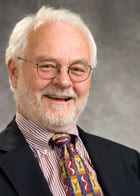By Andrew Cohen
Jarred by the surge of gun violence in the United States and frustrated by congressional inaction, President Obama recently announced a set of executive orders to promote gun safety reform. House and Senate Republicans have blasted the president’s move, vowing to block it, and many political experts think it will be challenged in the courts.
The executive orders call for stronger background checks, more resources to enforce existing gun laws, enhanced safety technology, and more money and access for mental health services. With the efficacy and legality of Obama’s plan a source of heated national debate, we asked professors and renowned criminal law experts Malcolm Feeley, Jonathan Simon ’87, and Franklin Zimring to forecast its impact on U.S. homicide rates and the challenges ahead.
An uphill climb

Feeley offers a blunt outlook for immediate change. “If all of Obama’s proposals are fully implemented, they’ll hardly put a dent in the problem,” he said. Given the millions of firearms already in the country, Feeley added that curbing future gun sales “will only get us so far.” He also noted that many guns used in crimes are stolen, meaning “more background checks and education about gun use will have scant effect.”
Nevertheless, Feeley sees Obama’s plan as a positive step regarding suicides, which constitute a large portion of gun deaths, because “better storage, training, and more secure possession should make some difference.” In addition, he thinks improving gun safety technology will reduce fatal accidents, particularly by children. He added that removing military equipment from the marketplace, “if at all possible, would reduce if not deter shooting sprees by unhinged men.”
Feeley also touted the importance of discussing gun control from the nation’s highest perch. “The White House is a bully pulpit, and the president should use it in dealing with issues of great moral import even if there’s only a slight chance it will make much of a difference,” he said. “Isn’t that what pulpits are for; to help us believe in miracles?”
Elevating the issue, Feeley said, may also help Obama counter the National Rifle Association’s influence in Congress by encouraging a “rational and nuanced discussion of the complexities” of steps to curb gun violence.
To Feeley’s view, however, lasting change requires institutional reform. “Young people who use guns likely don’t have the same access to jobs that others do, and a poor young man’s request for police help is far less likely to be taken seriously by the police than my request,” he said. “This may explain in part why despite widespread gun ownership in Canada, Switzerland, and Israel, there’s far less gun violence in those countries than in the U.S.”
One step of many

If Obama’s proposals can be achieved without major political concessions, Simon believes they will ultimately save some lives—but not alter homicide rates.
Moving that needle, he said, demands a new approach from police departments and prosecutors. Given what Simon calls “the deep disparity in the value of black lives expressed by our criminal justice priorities,” he questions whether Obama’s proposals “would alter the stream of weapons that feed extraordinarily high homicide rates among black males who haven’t completed high school.”
The executive orders included funding in the president’s next budget for 200 new personnel to help enforce national gun laws, and $4 million to enhance the monitoring of illegal online firearms trafficking. To reduce gun homicides, however, Simon said local law enforcement officials must “recommit themselves to solving murders in the poorest parts of our cities.”
While innovative cease-fire programs in Oakland and Boston have been hailed as promising templates, Simon said “much more and better empirical research needs to be done.” He calls for a national set of experiments to find the best ways to “restore, reintegrate, rehabilitate, or at least deter the networks of men in which gun violence has become part of their social and cultural capital.”
Regarding Obama’s order to invest $500 million in access to mental health care, Simon is admittedly dubious. “Only a very, very tiny portion of people living with untreated mental illness pose a serious risk of violence to others,” he said.
Background check battle

Obama’s executive orders state that anyone engaged in the business of selling guns, not just sellers with established stores, must be licensed as dealers and conduct background checks of their buyers. Because the definition of “engaged in the business” is murky under existing law, Zimring expects Obama’s efforts to ultimately be decided by the courts.
In the meantime, he noted that “it’s pretty easy to get those who don’t want to have their backgrounds checked together with sellers who won’t check them.”
As for citizens who fear Obama wants to take away their guns, Zimring finds the concern misplaced. He said strengthened background checks aim to ensure that people legally entitled to own firearms “can have all the guns they want,” while stopping those “who aren’t entitled from having any.”
In terms of their legality, Zimring said the orders are consistent with the executive branch’s role “to make legislative standards coherent and clear”—particularly given the flimsy legal line between gun dealer and individual seller.
The White House said the FBI will hire more than 230 examiners and other staff to process background checks, increasing the existing workforce by 50 percent. Zimring agrees that more resources are needed to successfully enforce expanded background checks, but cites another key factor: “How easy it is to do technologically.”
While skeptical about the impact of Obama’s executive orders, the professors are not surprised by them given Congress’ unwillingness to pass legislation. “We are only likely to see small, incremental reductions in gun violence at best,” Feeley said. “But nothing is likely to happen if the occupant of the bully pulpit doesn’t use it effectively.”